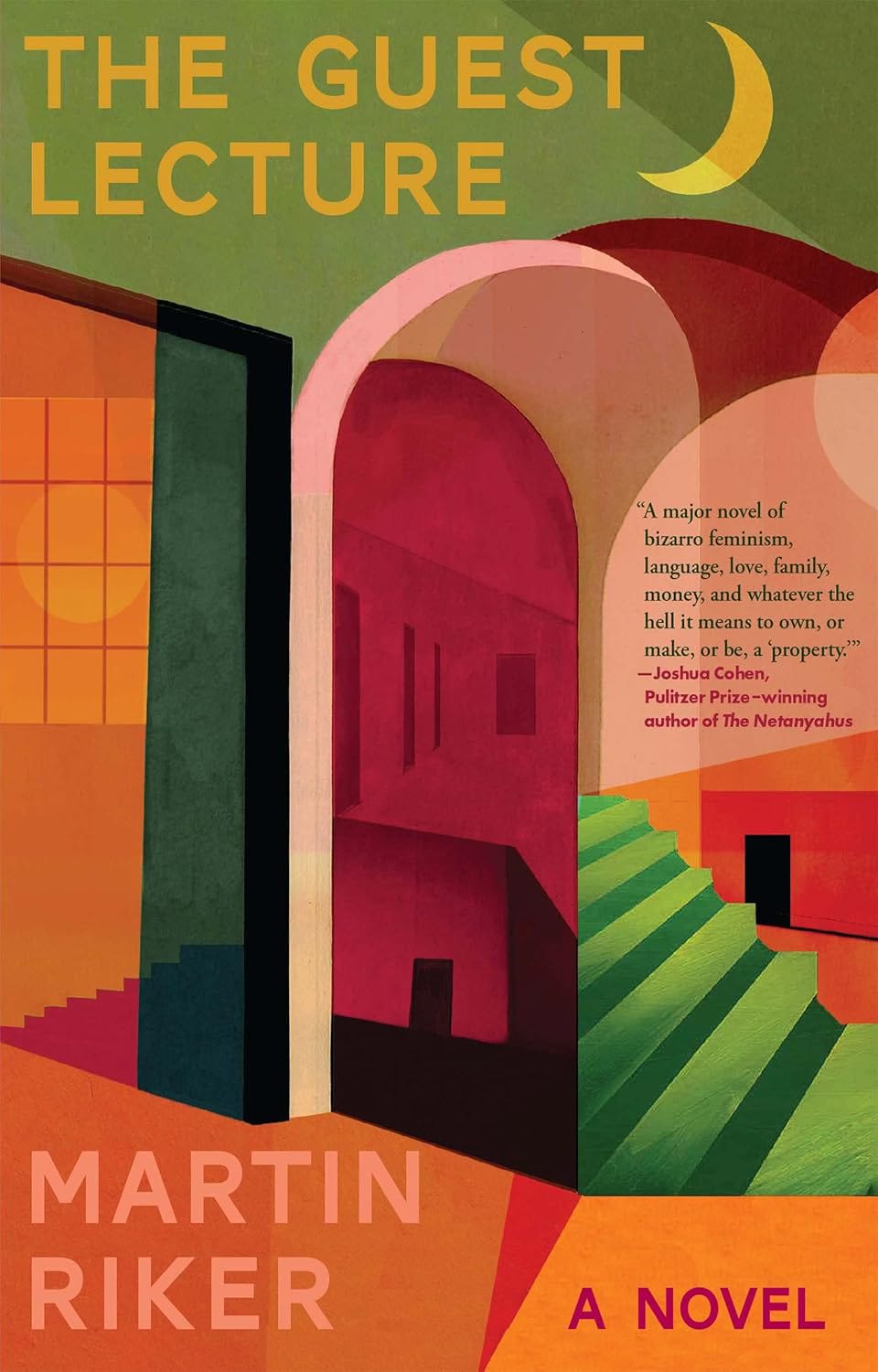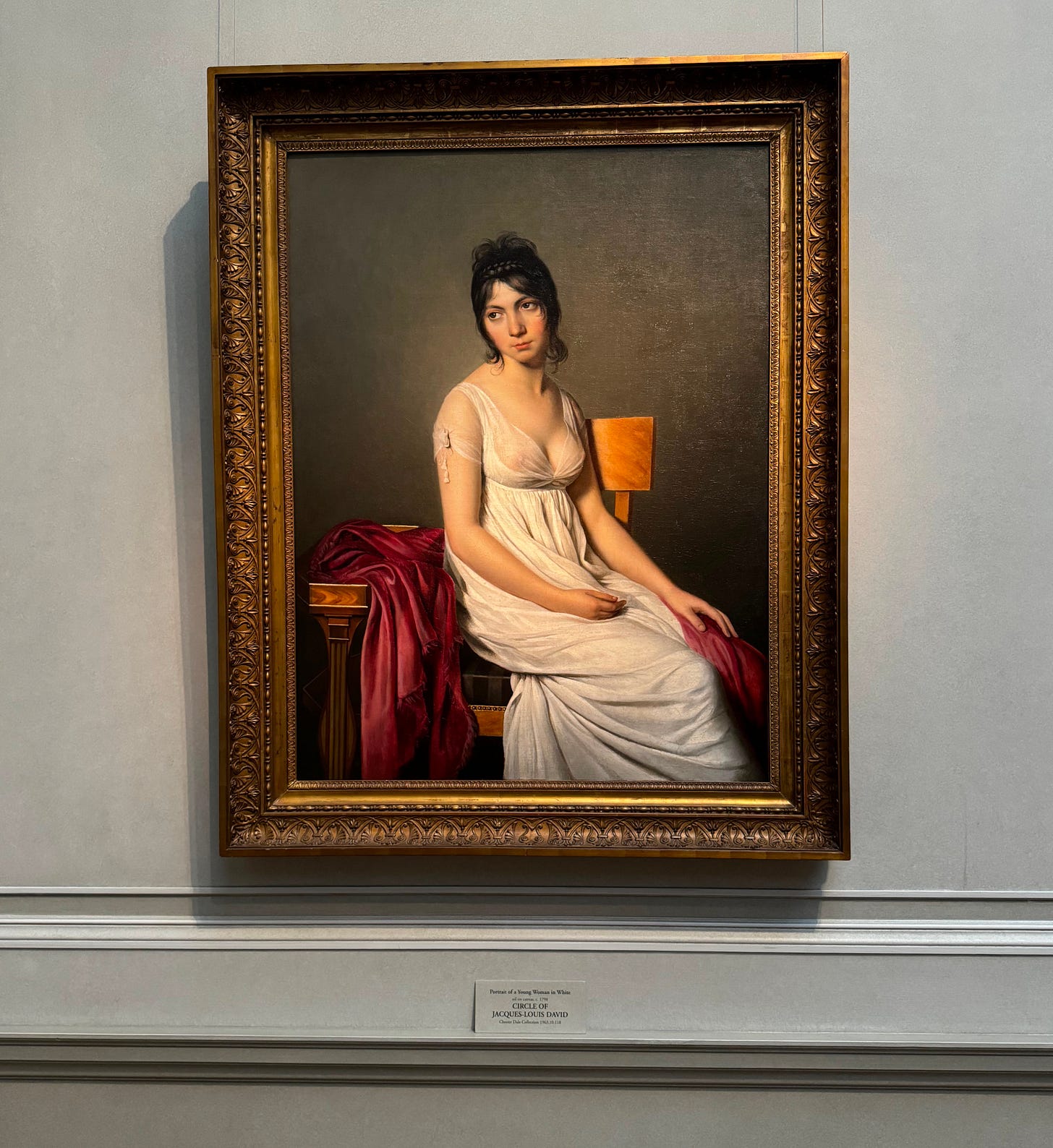This is not a guest post (sorry to disappoint), but a few thoughts from yours truly on Martin Riker’s recent novel, The Guest Lecture.

Specifically, I want to talk about the nature of its premise:
An insomniac economist mentally reviews her impending talk on John Maynard Keynes via a loci-method house tour with Keynes himself.
Unusual, right? And not just unusual, but unusual in a particular way. Maynard; mnemonics—it’s specifically unusual. Niche. Perhaps so much so as to be a bit off-putting, like a dish featuring an incongruous combination of ingredients.
The thing about such incongruous dishes—the peanut-butter-bacon sandwiches and chocolate-avocado mousses of the world—is that at a quality restaurant, they are disproportionately good. There’s almost a flex involved in their strangeness, in overcoming some visceral handicap to make it on the menu anyway.
The Guest Lecture and books (un)like it, which I’ll call bizarre-premise novels, function similarly in their divergence. Consider a few other recent examples:
A woman cares for two children who literally spontaneously combust.
A total knockout drugs herself to sleep for a year.
A canceled novelist makes Ayn Rand her entire personality.
And in line with the cover blurb: “An Account of A Minor and Ultimately Even Negligible Incident in the History of a Very Famous Family”
The extreme edge of bizarre-premise novels start to verge into Lolita territory; ostentatiously provocative, offensive—and utterly triumphant when they work. The Sellout comes to mind. But I’m more interested in the garden variety today, in the tendencies and mechanics of novels more whimsically bewildering than taboo. In the glorious tradition of my beloved Zuleika Dobson.
For this purpose, it would be hard to find a better contemporary exemplar than Riker’s.
Macro vs. micro bizarreness
Bizarre-premise novels manifest their strangeness at the book level, generally exhibiting great internal consistency. This is in marked contrast to micro-bizarre page-to-page “quirkiness,” the sort of novel that seems to scream: “look how irreverent I am!” No, bizarre-premise novels commit. They are full-throttle, high-stakes weird, like David Bowie as opposed to Zoey Deschanel.
This level of commitment and the natural tendency of bizarre-premise novels to go deep requires authorial interest and genuine expertise distinct from the sort of cursory internet research Franzen chafes against (8. “When information becomes free and universally accessible, voluminous research for a novel is devalued along with it.” –Jonathan Franzen). As such, bizarre premise novels are disproportionately written by authors eminently if not uniquely suited to write them, and the books themselves of higher than average quality.
I do want to distinguish the benefits of leveraging deep subject matter expertise from any sort of ridiculous identitarian creative restrictions. The Guest Lecture puts an exclamation mark on the point, its male author nailing the anxious self-talk of a highly educated woman. Consider this paragraph from the first chapter in which Riker’s narrator, Abigail, introduces the loci method:
Once upon a time, Simonides of Ceos, a poet who lived so long ago that he actually invented several letters of the Greek alphabet, was at a banquet, a swanky affair. At some point in the evening he was called outside, maybe he needed to pee, I don’t remember, but while he was gone the roof collapsed and killed everyone. The bodies were too mangled to identify—lovely story, Ed—but Simonides of Ceos pulled an interesting trick: by mentally imagining himself moving around the room, he was able to recall all of the people in the order in which they’d been seated. And a colleague of his, or just someone who was listening, and who was apparently unfazed by the gruesome backstory, realized this would be a great way to remember a speech. You assign a different portion of the speech to each room of a building you know well, then you mentally move through this building as you go, remembering each speech portion by picturing yourself in the room you put it in. Thus out of the ruins of the worst party ever—says Ed—came a method of memorization taught by Cicero and Quintillian and practiced by lawyers and politicians for hundreds of years.
Riker is dropping some pretty localized knowledge of rhetorical history here. But bizarre-premise novels often get away with such swaths of expository text, transforming what is generally considered a novelistic bug into a feature.
I don’t want to discount the impact of sheer quality in toeing this line; think of Tolstoy, whose premises—war, marriage, family, adultery—could hardly be more universal. In less deft hands, Riker’s text would lean more essayistic than it does. When you break down why exactly it doesn't, though, these attributes also tend to apply to the other novels above; to be typical of bizarre-premise novels categorically.
For starters? The narrow depth of macro bizarreness. Readers are less likely to chafe against didactic asides in novels when the information provided is, well, novel.
They are even less likely to when it’s funny.
Leggerezza
Bizarre-premise novels do tend to be funny, which is probably not independent from literary quality either at a time when so much fiction drowns in simple trauma. Again, it’s a specific sort of humor that reigns supreme: a winking, tonal chiaroscuro, giving witty lightness to dark stuff in a way I associate above all with Ovid, but also Dorian Gray.
The loci method paragraph has this precise leggerezza—the mangled bodies and mass death offset by sardonic asides and Abigail’s blithe consciousness of the incongruity. It’s all very you’re-walking-through-the-museum-and-run-into-this:
Which is the perfect segue into another leggerezza of bizarre-premise novels, found in their relationship to realism. It’s tenuous. Simultaneously exacting and featherweight, like photorealistic gossamer drapery atop a transparently contrived pose.
Here’s Abigail, a few paragraphs after the loci method passage, conversing with herself qua Keynes. Riker uses quotation marks only for the Keynesian side of her imagined conversation:
“You get to show me around.”
I do.
“You've always felt a special affection for me.”
For some reason!
“We will move through your house and your speech together.”
Because even an imagined togetherness beats being alone.
“Though I should point out that the atmosphere of loneliness you’ve imposed upon the rhetorical house you are constructing in your imagination has only to do with the fact that you are stuck here rattling around in your head rather than standing in front of, and talking to, people. Your mind won’t wander like this tomorrow. You’ll be addressing actual people who are expecting to hear something interesting, or at least coherent. There won’t be time for me, or need for me, then.”
Will that be sad?
It will not.
All of this will end. Life will move on to whatever comes next.
“We’re finished with the living room?” Keynes, standing, pats down his pants.
We’re finished with the living room.
“Off to the dining room, then!”
In its admitted fabrication, this is entirely realistic! A realistic depiction of imagination itself. The oblong magical realism of Nothing to See Here, tightly circumscribing the magic to the children’s explosiveness, achieves a similar effect through different means—as does Cohen’s fictionalization of the all-too-real Netanyahu family.
All three techniques offset the heavy woe of capital-R Realism to provide fertile ground for leggerezza in unexpected places—Zionism, child neglect, and (shudder) the vicissitudes of academic life.
Paradox
Novelly essayistic, realistically imaginative, funny and serious, heavy and light. As I was recently reminded (alas, I cannot remember where), paradox is humor’s pinnacle. Perhaps it is the novel’s, too.
Any novel premise can work with the right execution; indeed, this is one of the great benefits of the form’s endless flexibility. But in an enterprise so dependent on execution, I find it all the more compelling to have found such a disproportionately effective novelistic strategy.
I’ve combed my reading from recent years, and have yet to alight on a single novel that I’d categorize as both bizarre premise and aesthetically bad. Please tell me if you do! I’d also love to hear your favorites.
Thanks for reading and bon week-end,
ANJ



I’ll have to check this book out.
A couple of novels with bizarre premises or maybe similar vibes come to mind: Peter Ackroyd’s English Music and The Biographers Tale by A. S. Byatt.
Another excellent post! I love bizarre-premise stories, especially when they're followed (all the way) through. I haven't read the novel on which it's based, but the movie La Moustache (https://en.wikipedia.org/wiki/The_Moustache_(film)) does its premise justice.